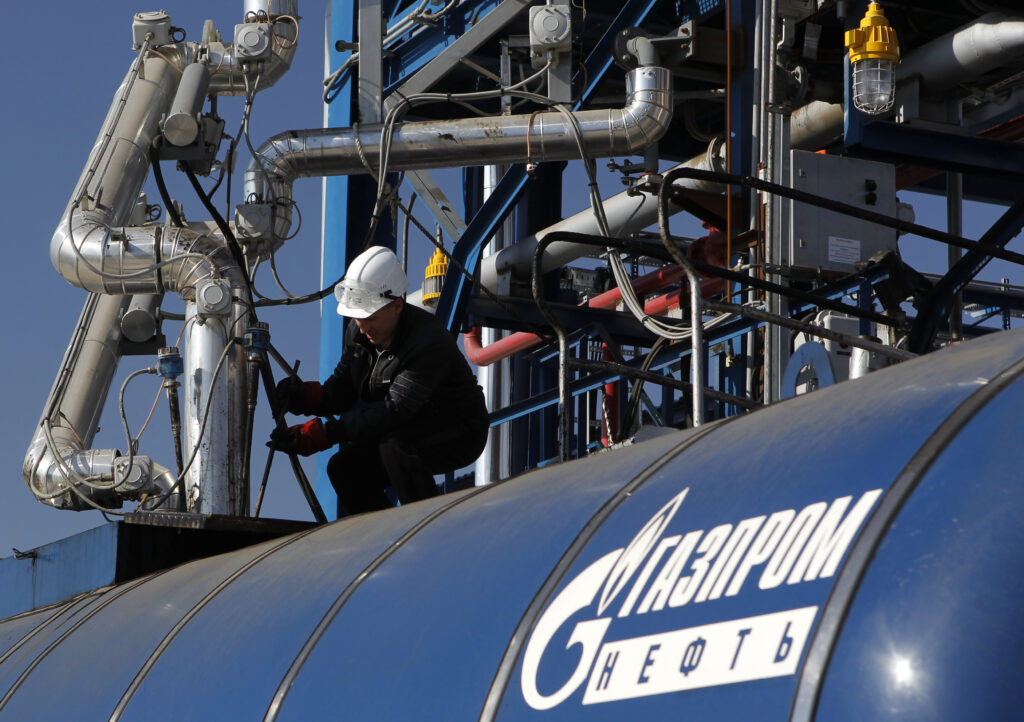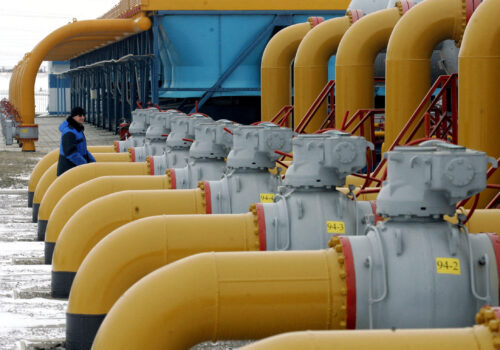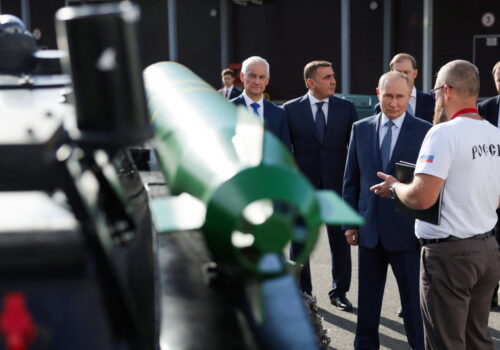He’s delivering one last punch. With ten days to go in US President Joe Biden’s term, his Treasury Department on Friday announced tough new sanctions on Russia, specifically targeting the oil and gas industry. The United Kingdom also joined in the sanctions on the Russian oil companies Gazprom Neft and Surgutneftegas. To make sense of the impact of these measures as Russia’s full-scale war on Ukraine nears the three-year mark, and how the incoming Trump administration might react, we checked in with our sanctions experts.
1. How are these different from past rounds of sanctions?
Friday’s actions targeting Russia’s energy sector have the potential to significantly disrupt Russia’s ability to generate revenue from the sale of oil. Unlike previous efforts to restrict Russia’s oil profits, such as the sixty-dollar-per-barrel price cap and sanctions on financial institutions such as Gazprombank, the latest sanctions directly target Russia’s energy sector and its ability to export oil. Notably, the United States and the United Kingdom designated two important Russian oil producers and exporters, Gazprom Neft and Surgutneftegas, along with their subsidiaries, which handle more than a quarter of Russia’s seaborne oil exports. These entities were designated under two different authorities—Executive Order (EO) 14024 and EO 13662. This is significant because EO 13662 sanctions are codified in law, specifically the Countering America’s Adversaries through Sanctions Act of 2017. This means that the incoming Trump administration will need to confer with Congress if it wants to lift the sanctions on these companies.
Friday’s actions also include a significant amendment to General License (GL) 8k, which authorized energy transactions with certain Russian entities and was set to expire at the end of April 2025. The US Treasury amended GL 8k by issuing General License 8l on Friday. GL 8l authorizes the wind down of energy transactions with these entities by March 12, 2025. In effect, this means that after March 12, there are no more general licenses for energy transactions with Russia, and anyone that continues to transact with sanctioned Russian energy entities could expose themselves to US sanctions. This could severely restrict Russian energy exports.
—Kimberly Donovan is the director of the Economic Statecraft Initiative at the Atlantic Council’s GeoEconomics Center. She previously served in the federal government for fifteen years, most recently as the acting associate director of the Treasury Department Financial Crimes Enforcement Network’s Intelligence Division.
The Biden administration has taken aim at Russia’s oil exports, by far its biggest foreign exchange earner, with a series of measures that will bite. The Biden team waited until late in the administration because US oil production (and exports) are at record levels and rising, and therefore the price impact of taking Russian oil off the market, the objective of today’s sanctions, will be attenuated. Additionally, the US election is over, meaning that tolerance for oil price hikes among some in extended Biden world is greater.
Today’s sanctions hit two big Russian oil companies, Gazprom Neft and Surgutneftegas, as well as 183 vessels in the Russian “shadow fleet” of sanctions-evading tankers, some of which have also committed sabotage against Baltic Sea infrastructure. The sanctions also go after dodgy oil traders from the United Arab Emirates and Hong Kong that appear responsible for circumventing the Russian oil price cap and oilfield technical services providers. In addition, the sanctions target Russian liquefied natural gas (LNG) terminals and Chinese companies involved in Russia’s Arctic LNG 2 project, with the aim of disrupting Russian LNG exports, as well as the Vostok oil project, coal companies, and other businesses in the metals sector. Lastly, the sanctions shorten a wind-down period for some energy related transactions.
In short, the US government has gone after the Russian oil sector in a big way, intending to deal what may turn out to be a body blow.
—Daniel Fried is the Weiser Family distinguished fellow at the Atlantic Council. As US State Department coordinator of sanctions policy, he crafted US sanctions on Russia following its 2014 aggression against Ukraine.
The steps taken by the Biden administration are excellent, putting additional pressure on Russia’s ability to profit from the export of oil. But the critical point, of course, is implementation of these new measures. Which means that it is the Trump administration that will determine if these measures do in fact put pressure on the Russian economy.
—John E. Herbst is the senior director of the Atlantic Council’s Eurasia Center. He served as the United States’ ambassador to Ukraine from 2003 to 2006.
2. What impact do you expect this to have on the Russian economy?
These sanctions were a long-time coming, having been delayed for two years. But they are a serious effort to curb Russian oil revenues. These sanctions’ unprecedented impact and thorough scope are not weighted down by the competing agenda of avoiding Russian oil volumes dropping on the market, which diluted the 2022 price cap’s effectiveness. While oil prices remain a concern, the market is in a much healthier, more resilient place compared to three years ago. The Middle East and spare capacity outside of the OPEC+ cartel can fill in lost Russian volumes if global oil prices keep rising. Moreover, these sanctions can help to bring Russia’s oil sanctions evasion—and resulting revenues—out from under the shadows, which could help with suppressing prices for the remaining Russian oil exports, as doing business with Russia’s energy sector becomes riskier, costlier, and even more complicated.
Today’s actions show the blueprint for addressing sanctions evasion. They highlight the United States’ and its allies’ ability to track Russia’s nefarious activities in the energy trade, as well as the players and foreign partners enabling circumvention by providing oilfield services, shipments, trading, port access, and insurance, and acting as intermediaries. They will constitute a financial hit to Russia’s budget, made only more powerful coming on the heels of a six-billion-dollar loss from the end of the Ukraine gas transit. The oil trade is the ruble’s last life raft, and the Kremlin does not have a quick fix to the punctures made by these new US sanctions.
—Olga Khakova is the deputy director for European energy security at the Atlantic Council’s Global Energy Center.
The Russian economy is already under stress, and these sanctions will add to it. How much is not knowable: the Kremlin will have motive and opportunity to try to evade these measures and much depends on how well they are enforced. But even imperfect sanctions have value. Sanctions by themselves will not save Ukraine, but intensified economic pressure, combined with the arms surge to Kyiv that the Biden administration has launched in recent weeks, have a good chance of eroding Russia’s advantage in its war against Ukraine. These latest sanctions are among the most important since 2022: they followed the money.
—Daniel Fried
Russia has continued to generate revenue from oil sales despite Western sanctions. Friday’s actions directly targeting Russia’s energy sector will make it very difficult for oil importers to transact with Russia, and they send a strong message to countries that continue to import Russian oil. Such countries could find themselves the subject of US sanctions if they continue to buy oil from Russia.
—Kimberly Donovan
To be clear, it is in the US interest to implement these measures fully. Both in Soviet and Russian times, high hydrocarbon prices fattened Moscow’s budget and gave it the means to pursue aggressive policies abroad. Low oil and gas prices in the 1980s heightened economic problems in the Soviet Union, prompted Soviet leader Mikhail Gorbachev to pursue reform and a true policy of détente, and ultimately hastened the collapse of the Soviet Union. Russian President Vladimir Putin’s policies turned aggressive in the aughts, after years of high oil prices that allowed him to reduce Russian debt and modernize his military.
—John E. Herbst
3. What impact do you expect this to have on the US and its European allies?
Going after Russia’s oil exports would have been a bad idea when US oil export capacity was less (which is why the Obama administration avoided such steps after the first Russian invasion of Ukraine in 2014, choosing to limit itself to steps to curtail future Russian oil production). Now that US oil production has grown, and Europe has diversified away from Russian energy sources, the options for hitting Russia’s oil industry are greater and the administration took them.
—Daniel Fried
4. How can we expect the Trump administration to pick up the baton from here?
It is difficult to determine what steps the incoming administration will take vis-à-vis Russia. It appears that President-elect Donald Trump intends to negotiate a deal with Russian President Vladimir Putin over Ukraine to end the war. These oil sanctions have the potential to squeeze Russia’s economy by reducing its oil revenues. If the next administration enforces Friday’s actions and takes further steps to target Russian oil, as well as the third countries importing and re-exporting Russian oil, then the Trump administration will be in a strong negotiating position to make a deal with Putin that is in the best interest for Ukraine and US national security interests.
—Kimberly Donovan
Trump has both economic and geopolitical reasons to implement these measures. He has not hidden his intention to “drill, baby, drill,” which means that reducing Russia’s ability to export oil will weaken a competitor to growing US oil exports. But Trump also has geopolitical reasons for doing so. His team has laid out terms for a potential peace deal to end Moscow’s aggression against Ukraine. Those terms require compromise from both Ukraine and Russia. Ukrainian President Volodymyr Zelenskyy has acknowledged his readiness to compromise. Putin has not. The incoming administration needs leverage to persuade Putin to compromise. Reducing Russian hydrocarbon revenues would provide some leverage. Not nearly as much as, for instance, a Trump-proposed military aid package, but still a good step forward.
—John E. Herbst
The Biden administration has done the incoming Trump team a solid: increasing its leverage as the incoming team intensifies efforts to reach a sustainable settlement of the war. Speculation that the Trump administration will immediately revoke the sanctions, giving away leverage, is premature and possibly flat wrong. In any case, the Trump team will not be able to rescind most of the sanctions without a fight: those sanctions issued under Executive Order 13662 are subject to the Countering America’s Adversaries Through Sanctions Act legislation from 2017 that provides for a mandatory congressional review of rescinded sanctions. Additionally, for reasons both strategic and economic, the Trump team appears interested in having US oil and LNG exports replace Russian supplies on world markets. The Biden administration sanctions advance that reasonable objective.
The chances of the Kremlin acting in good faith to help end the war are slim (to be generous). If some settlement takes shape, sanctions relief will be part of the Kremlin’s demands. The Trump team should be cautious about doing so. But that’s a different sort of challenge. The task now is to push back on Putin from a position of strength so he abandons his aim of conquering Ukraine and intimidating Europe through pressure and sabotage. These sanctions advance that objective, which just might be shared by the outgoing and incoming administrations.
—Daniel Fried
A lot has changed since Trump’s first term. The United States and Russia now much more directly compete with one another in global and European oil and gas markets. For instance, US global crude oil exports today stand at about four million barrels per day today, up from seven hundred thousand barrels per day in January 2017. Similarly, in January 2017, the United States exported about 1.7 billion cubic feet per day (Bcf/d) of liquefied natural gas; monthly exports now exceed 12 Bcf/d. Notably, in February 2022, many US oil and gas companies lit their Houston headquarters with images of the Ukrainian flag. This was no doubt done partly in solidarity with a sovereign nation facing an invasion, but economic self-interest may have also played a role. If Trump completely relaxes oil sanctions on Russia, then it will impact US oil and gas companies, along with their employees and investors. The Trump administration may recognize that Russia is not only a military threat, including through its transfer of ultra-sensitive weapons technology to China that could be used to target US forces. But Russia also threatens US economic interests.
The policy trajectory of the incoming Trump administration remains highly uncertain. Don’t be shocked, however, if Trump reinforces or intensifies oil sanctions on Russia instead of softening them. Indeed, the Trump administration may have a unique opportunity to leverage its relationships with Gulf Cooperation Council countries. OPEC’s crude oil spare production capacity was recently estimated at around 5.1 million barrels per day, whereas Russia’s export of crude oil and crude products runs between four million and five million barrels per day. If Trump can persuade OPEC to boost production at the expense of Russian volumes—a deal his predecessor was never able to strike—he could secure leverage over Moscow, maintain low world energy prices, and keep US oil and gas companies and their customers happy.
—Joseph Webster is a senior fellow at the Atlantic Council’s Global Energy Center and its Indo-Pacific Security Initiative. He is also an editor of the independent China-Russia Report.
Further reading
Mon, Jan 6, 2025
The Russia-Ukraine energy divorce offers a chance for Europe to take control of its energy security
New Atlanticist By Olga Khakova
Ukraine’s closure of a pipeline that supplied Russian gas to Europe offers the European Union an opportunity to enhance its economic and energy security.
Tue, Nov 5, 2024
To counter the Axis of Evasion, the US must tackle third-country procurement networks
New Atlanticist By Kimberly Donovan
Russia, China, Iran, and North Korea are increasing their coordination with illicit procurement networks through third countries.
Thu, Apr 17, 2025
Russia Sanctions Database
Econographics By Kimberly Donovan, Maia Nikoladze, Lize de Kruijf
The Atlantic Council’s Russia Sanctions Database tracks the level of coordination among Western allies in sanctioning Russian entities, individuals, vessels, and aircraft, and shows where gaps still remain.
Image: An employee works on an equipment at the Gazprom Neft oil refinery in Moscow September 20, 2012. Gazprom Neft is the oil division of Russian energy company Gazprom. REUTERS/Maxim Shemetov



